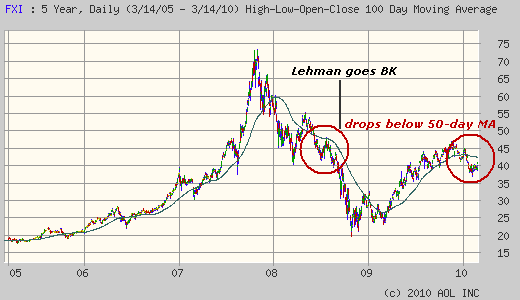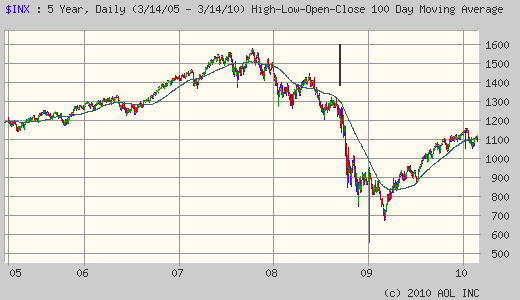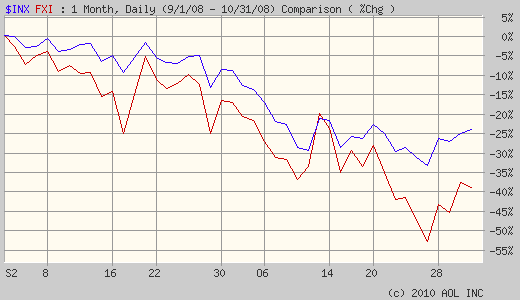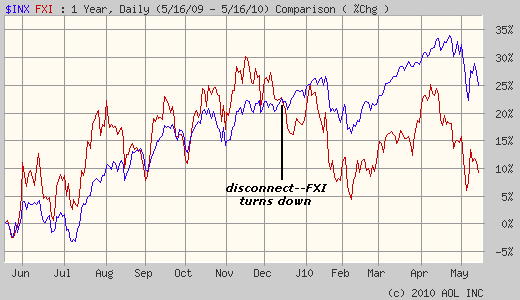If China Stocks Lead U.S. Market, Look Out Below
by Charles Hugh Smith
The economies of China and the U.S. are in effect Siamese Twins, joined at the hip.By pegging their currency to the U.S. dollar, the Chinese central government has tethered its economy to both U.S. policy and the U.S. economy.
Since the U.S. economy is still considerably larger than China's, and the yuan/renminbi is pegged to the dollar (and not vice versa), then we might expect China's stock market to follow the American market's lead.
As expected, the two markets are clearly correlated, often acting in lockstep (both rising or falling together). But China's markets also seem to act as the canary in the coalmine for the U.S. markets, declining before U.S. markets plummet.
Volatility rules all markets nowadays. China is certainly not exempt. On Monday, China Stocks Plunge Most Since August on Property Curbs, and then today Chinese property stocks soared because some rumor claimed the government did not have the authority to impose property taxes-- Chinese Property Shares Surge on Debunked Tax Threats.
Note to rumor mongers: China remains a command economy ruled by an all-powerful Communist Party. It can impose property taxes whenever it decides to do so. If a rumor depending on the legal constraints of the Chinese central government is needed to prop up Chinese real estate, then the "rally" has the staying power of a leaf in the wind.
(The issue here is that there are no property taxes in China now, so any imposition of a tax on real estate ownership would raise the financial burdens of speculative ownership. Creating property taxes would thus act as a disincentive to buying more property.)
Let's look at some charts to see if China's market tends to lead the U.S. market.
The best way to see if there is any relationship is to pull up a chart of each market. I am using the S&P 500 as representative of the U.S. stock market and the Xinhua China 25 Index (FXI) s a proxy for China's market. Before zooming in to look at recent market action, I've chosen a longer-term 5-year chart of each market.


As a simple indicator of each market's internal strength or weakness, I've placed the 100-day moving average (MA) on each chart. In technical terms, when price stays above a long-term moving average, it is bullish; if price drops below the moving average and can't reclaim a place above that trendline, then it's bearish.
As we can see, China's stock market rocketed up in a stupendous bubble, doubling and tripling on its ascent to a peak in the week of October 16, 2007. Though the two indices don't seem to have much in common at first glance--the FXI was a bubble, the SPX a more leisurely Bull Market--the S&P 500 topped out just a few days before, on October 9, 2007, at 1,565.
This tight correlation remained in place during the subsequent declines and rallies which culminated in the waterfall of late September, 2008. Though the Chinese market fluctuated much more wildly in terms of percentage, the dips and recoveries are remarkably aligned until mid-September, 2008, just before global markets imploded in the wake of Lehman Brothers' collapse.
If we look closely at the fateful time just prior to the global meltdown, the S&P 500 was still clinging to its 100-day moving average. In contrast, the Chinese market had already sagged well below its 100-day MA. With the benefit of hindsight, it is clear the weakness in China's stock market preceded the cascade just ahead. (I have drawn in black lines to mark the same timeframe.)
Here is a close-up of September and October, 2008, with both markets depicted on one chart. The price movement of each index is plotted in percentage points.

The Chinese market weakened more than the S&P 500 right from the start of September, but it was the steep drop in China stocks around September 17, 2008 that was clearly a warning shot that all was not well.
As late as October 12-13, China stocks rose sharply along with U.S markets to "only" losing 20% of their value from September 1. But the weakness presaged in September came back with a vengeance, and the Chinese market plummeted to horrendous losses exceeding 50%.
What can we conclude from this study? That though Chinese and American stock markets are highly correlated in terms of peaks and valleys, relative weakness in Chinese stocks appears to have offered a "heads-up" of trouble ahead for U.S. markets. While the S&P500 clung to its 100-day moving average at the critical juncture, China's market had already fallen well below its 100-day moving average.
Let's now turn our attention to more recent market action in each of these markets: here is a chart depicting the FXI and S&P 500 from May 16, 2009 to May 16, 2010.

The two markets were highly correlated, rising and falling in near-perfect unison, until early December, when the Chinese market abruptly sank. In the subsequent weeks, the Chinese index continued to underperform the S&P 500. While the S&P 500 registered a significant rise in that timeframe, the Chinese market has yet to recover positive territory.
Given the correlation revealed in the charts above, Chinese stocks' relative weakness in the past five months should give U.S. investors pause. China's weakness might not be the cause of a steep decline in U.S. markets, but we ignore the correlation at our peril.
| Thank you, Max M. ($5/month), for your exceptionally generous voluntary subscription to the site. I am greatly honored by your ongoing support and readership. | Thank you, John W. ($20), for another phenomenally generous donation (via south-central China) to the site. I am greatly honored by your continuing support and readership. |



























